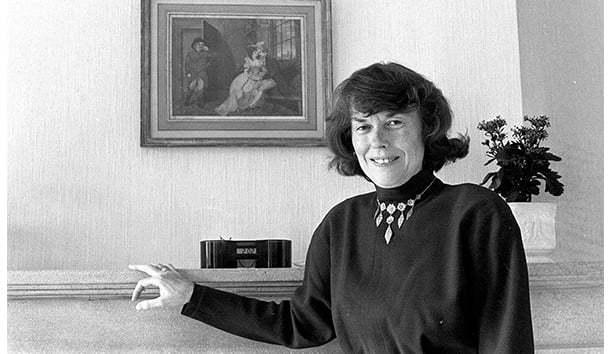The mice had a problem with Faith Whittlesey. These mice were not the four-legged kind; they were Chief of Staff Donald Regan’s functionaries in the Reagan White House, scurrying around and gnawing away at conservative policy efforts. Faith was Reagan’s director of the Office of Public Liaison, and she was not just a conservative but a warrior. Early in 1985, she had arranged for a showing at the White House of The Silent Scream, a documentary that used ultrasound imagery to depict the violence of abortion. The mice, and Regan himself, objected to the screening, and they objected even more to Faith’s attempt to give every member of Congress a copy of the video. The executive branch just couldn’t do that, they squeaked. So Faith called Rep. Henry Hyde, and he ensured that the film reached his colleagues through Congress.
Faith could not be deterred. Yet she was one of the greatest diplomats the American right ever produced, best known as Reagan’s ambassador to Switzerland. It was a position she held twice—at a time when repeat appointment was rare—first from 1981 to 1983, and then, following her time in the White House, from 1985 to 1988. She was a true Reaganite in the best sense of the term: She had supported the former California governor when it was not safe to do so, in his 1976 challenge to Gerald Ford. The GOP establishment struck back two years later, denying Faith the party’s nomination for lieutenant governor of Pennsylvania. She refused to learn her lesson: In 1980, she was instrumental in winning the Keystone State for Reagan. And in 2016—40 years after she defied the establishment by backing Reagan the first time—she became a prominent Republican for Donald Trump when that seemed like surefire political suicide.
Just how much Faith accomplished in building up the grassroots right in the Reagan era, and in the critical years before Reagan became President, when she was a state legislator and activist in Pennsylvania, is hard to overstate. She was as stalwart in support of the Second Amendment as she was in opposition to abortion. The great electoral engines of the Republican Party over the last three decades, the votes of Christian conservatives and unfashionable (now perhaps “deplorable”) gun owners, were built in considerable part by Faith Whittlesey.
But while the Republican Party cynically learned to channel that grassroots power into candidates and causes like the two Bushes and their wars, Faith poured her energy into diplomacy. She became head of the American Swiss Foundation after her second term as ambassador, and it was through the foundation’s Young Leaders program that I had the good fortune to meet her. Each year the program brings together roughly a dozen young Americans from business, journalism, state government, and other walks of life to spend a week among counterparts in the Swiss confederation. It’s an invaluable cultural exchange—particularly for a conservative interested in seeing stronger federalism and localism in operation—and also a window into our own republic’s future. Young Leaders selected by Faith had a knack for rising quickly: The state legislators found themselves elected to the U.S. House or, in the case of John Barrasso, the U.S. Senate.
When I took part in 2004, among the journalists were Tim Carney—then Bob Novak’s assistant, now an authority on crony capitalism and commentary editor at the Washington Examiner—and Joe Hagan, lately the author of Sticky Fingers: The Life and Times of Jann Wenner and Rolling Stone Magazine, as well as April Ryan, now the White House correspondent and Washington bureau chief of American Urban Radio Networks. Faith took seriously the responsibility to present the Swiss with an intelligent, civil, but politically diverse set of American interlocutors.
Faith was not born to comfort. She came into the world in 1939—into an America staring into the maw of world war and depression—and was brought up in what Pennsylvania’s Delaware County Daily Times describes as “a housing project in Williamsville, N.Y.” “I worked very hard and wasn’t married to a famous person. I didn’t have an independent fortune, but I had my Irish heritage,” she told the paper. Her fighting spirit saw her through to Wells College in Aurora, New York, and law school at the University of Pennsylvania. In the Keystone State, Amy Faith Ryan (as she then was) met and married Roger Whittlesey, with whom she had three children. Tragedy struck 11 years into the union, however, when Roger, bedeviled by clinical depression, committed suicide (a fate that would also claim their son Henry many years later). Faith first won public office as a Pennsylvania state representative in 1972; by the time she was re-elected in 1974, she was a widowed single mother. She put her children first, even as she took first Pennsylvania politics, then the Reagan White House and the world stage by storm—a charming, graceful, yet implacably principled force.
The title of Thomas Carty’s biography of Faith Whittlesey, Backwards in High Heels, comes from a quotation about Ginger Rogers that supplies an apt metaphor for Faith’s life as both a devoted mother among disdainful politicians and a principled conservative shunned by the feminist left and Republican mice alike: “Ginger Rogers did everything Fred Astaire did, except backwards and in high heels.”
Cancer could not stop her when it first struck in 1994, nor when it attacked again early in the 21st century, though each time it exacted a price. Even this year, as Faith grew ill for what she knew would almost certainly be the last time, she carried on, undeterred and unconquered. Long a Christian, she had come to the Catholic Church in 2000, and while she welcomed eternity, she devoted the fullness of time God gave her on this earth to the good fight and the truly good life. When she died on May 21, not only did Chronicles lose a dear friend and stalwart board member, the republic lost one of its finest daughters. But her memory and legacy endure.

Leave a Reply